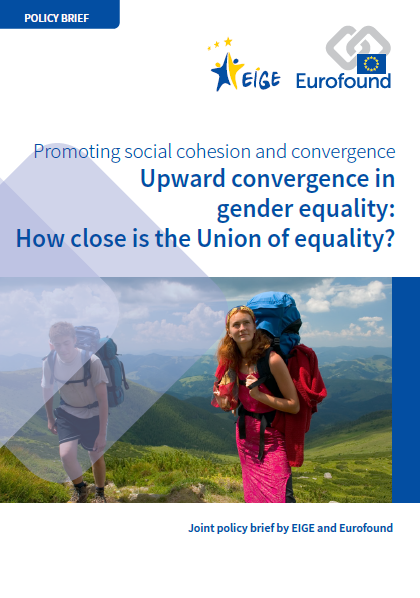
In den vergangenen zehn Jahren hat die EU langsam Fortschritte auf dem Weg hin zur Gleichstellung der Geschlechter gemacht. Da die Erfolge bei der Gleichstellung von Männern und Frauen von Mitgliedstaat zu Mitgliedstaat unterschiedlich sind, ist es wichtig, die Entwicklung dieser Unterschiede zwischen den Mitgliedstaaten und ihre Auswirkungen auf die wirtschaftliche und soziale Aufwärtskonvergenz in der EU zu verstehen. Von entscheidender Bedeutung ist es, dass die Auswirkungen der Covid-19-Krise nicht nur die bisherigen Erfolge gefährden können, sondern auch eine Verschärfung der Unterschiede zwischen den Mitgliedstaaten nach sich ziehen können.
Die vorliegende politische Kurzanalyse wurde von Eurofound und EIGE gemeinsam erarbeitet und widmet sich der Untersuchung der Konvergenzmuster bei der Geschlechtergleichstellung, gemessen am Gleichstellungsindex, im Zeitraum 2010-2018 in den Mitgliedstaaten.
Eurofound delivers high-quality expertise and data on living and working conditions in the EU. Gender (equality) is a cross-cutting theme in all activities of the Agency. The European Institute for Gender Equality (EIGE) is a partner in this area. More information about EIGE’s activities can be found on their website.
Key findings
In line with the EU’s overall trend of upward convergence, the Gender Equality Index rose in the EU and all Member States between 2010–2018, revealing a slight fall in disparities across countries.
Despite positive developments, progress in gender equality has varied across Member States with some from central and eastern Europe - already trailing in 2010 - improving their performance at a slower pace compared to the EU average and thus falling further behind.
The Gender Equality Index shows that between 2010 and 2018 the domain of power has been a driver behind progress in gender equality. At the same time, growing disparities have been recorded across countries in this area, revealing a clear pattern of upward divergence.
The social and economic impact of the COVID-19 crisis threatens to roll back past achievements in gender equality, particularly in countries with lower levels of gender equality where the biggest advances had been made. Measures to contain the pandemic have taken a heavier and disproportionate toll on women’s employment, increasing the time required for caring responsibilities.
As Member States emerge from the COVID-19 crisis and translate their recovery plans into action, it will be critical to ensure that new measures are gender-sensitive and that greater equality is achieved in both paid and unpaid work by, for example, increasing compensation for parental leave and facilitating greater involvement of fathers in childcare.
The policy brief contains the following list of figures:
List of figures
- Figure 1: Ranges of Gender Equality Index scores across Member States in 2018 and changes over time, EU-27
- Figure 2: Upward convergence in the Gender Equality Index (in points), EU-27, 2010–2018
- Figure 3: Member States’ scores in the Gender Equality Index grouped into four patterns, 2010–2018
- Figure 4: Catch-up in the Gender Equality Index, EU-27, 2010–2018
- Figure 5: Distance between the top performer and the other Member States in the Gender Equality Index (in points), EU-27, 2010–2018
- Figure 6: Convergence and divergence across the index domains and selected indicators, 2010–2018
- Figure 7: Proportion of women on company boards (%), by Member State, 2010 and 2018
- Figure 8: Proportion of women on company boards: comparison of Member States with and without national gender-balance quotas, 2003–2020
- Figure 9: Gender gaps in FTE employment (in percentage points), by Member State, 2010 and 2018
- Figure 10: Gender gaps in EHW employment and in enrolment in related fields of study (in percentage points), by Member State, 2010 and 2018
- Figure 11: Gender gaps in unpaid care work and housework (in percentage points), by Member State, 2007 and 2016
- Number of pages
-
24
- Reference nº
-
ef21041
- ISBN
-
978-92-9482-905-4
- Catalogue nº
-
MH-02-21-599-DE-N
- DOI
-
10.2839/427658
- Permalink
Eurofound’s convergeEU app enables users to perform upward convergence analysis using Gender Equality Index data provided by EIGE. Click the link below to access the app.
- EU convergence monitoring hub: convergeEU app
Cite this publication
Eurofound and EIGE (2021), Upward convergence in gender equality: How close is the Union of equality? Publications Office of the European Union, Luxembourg.